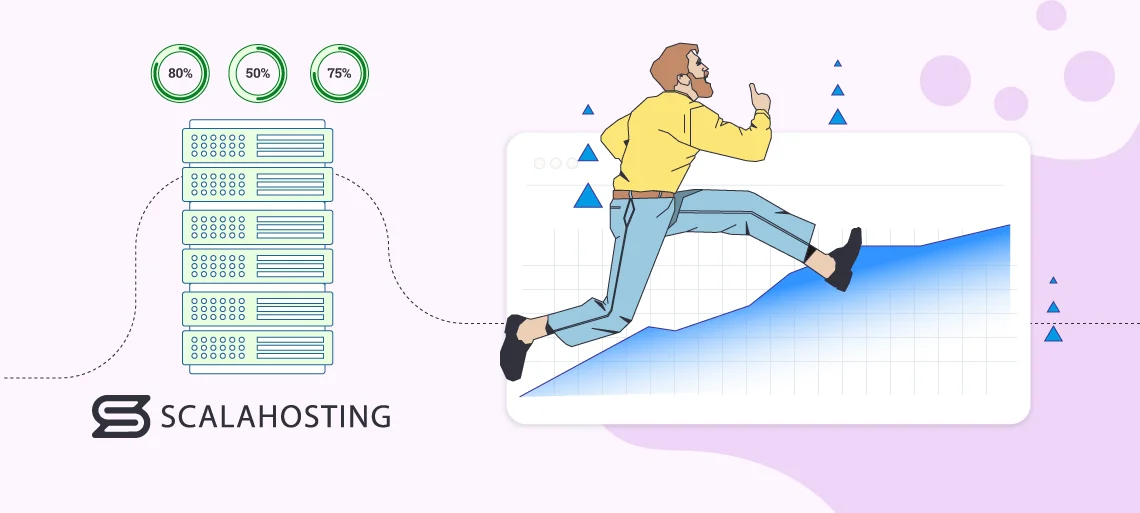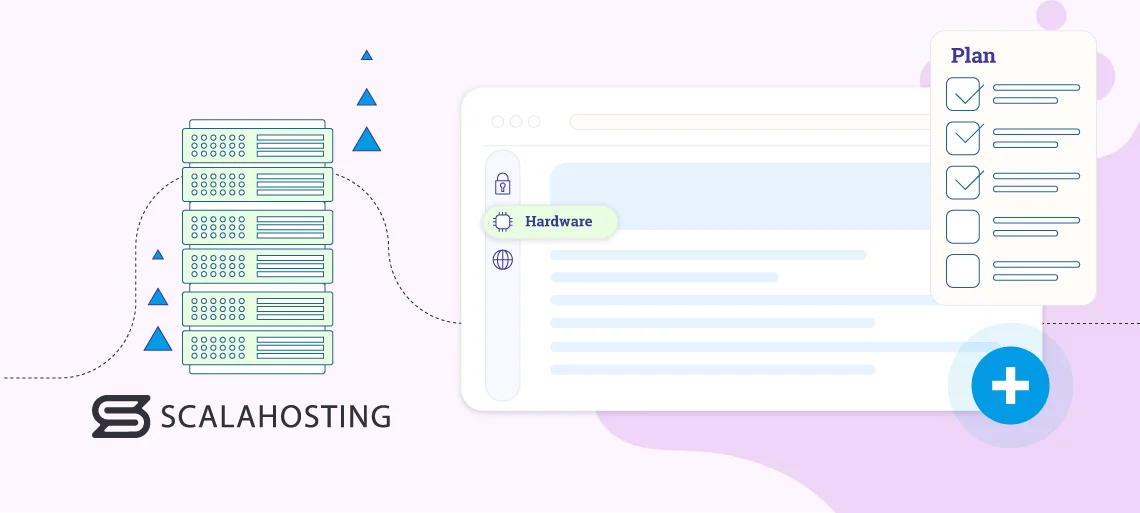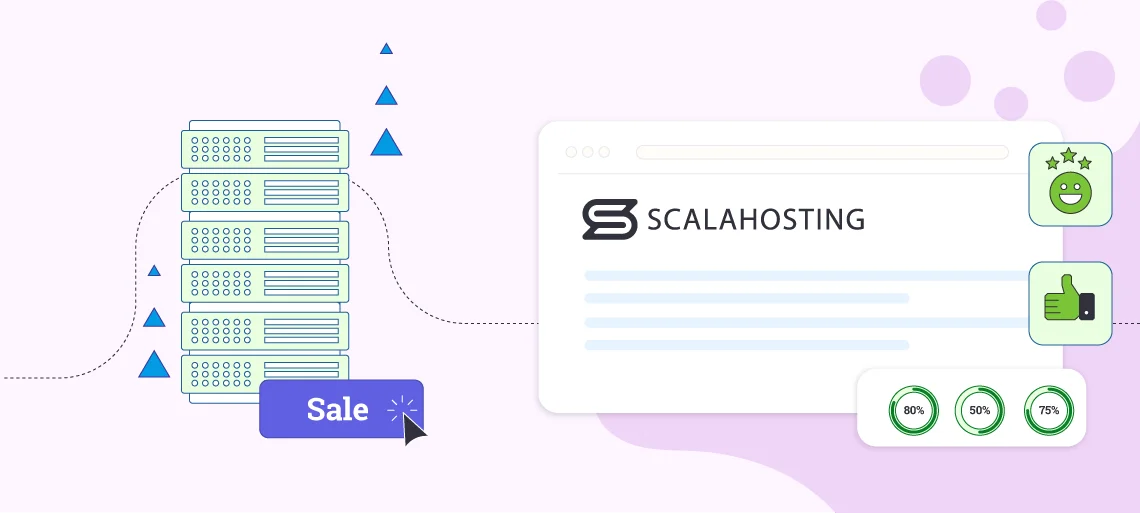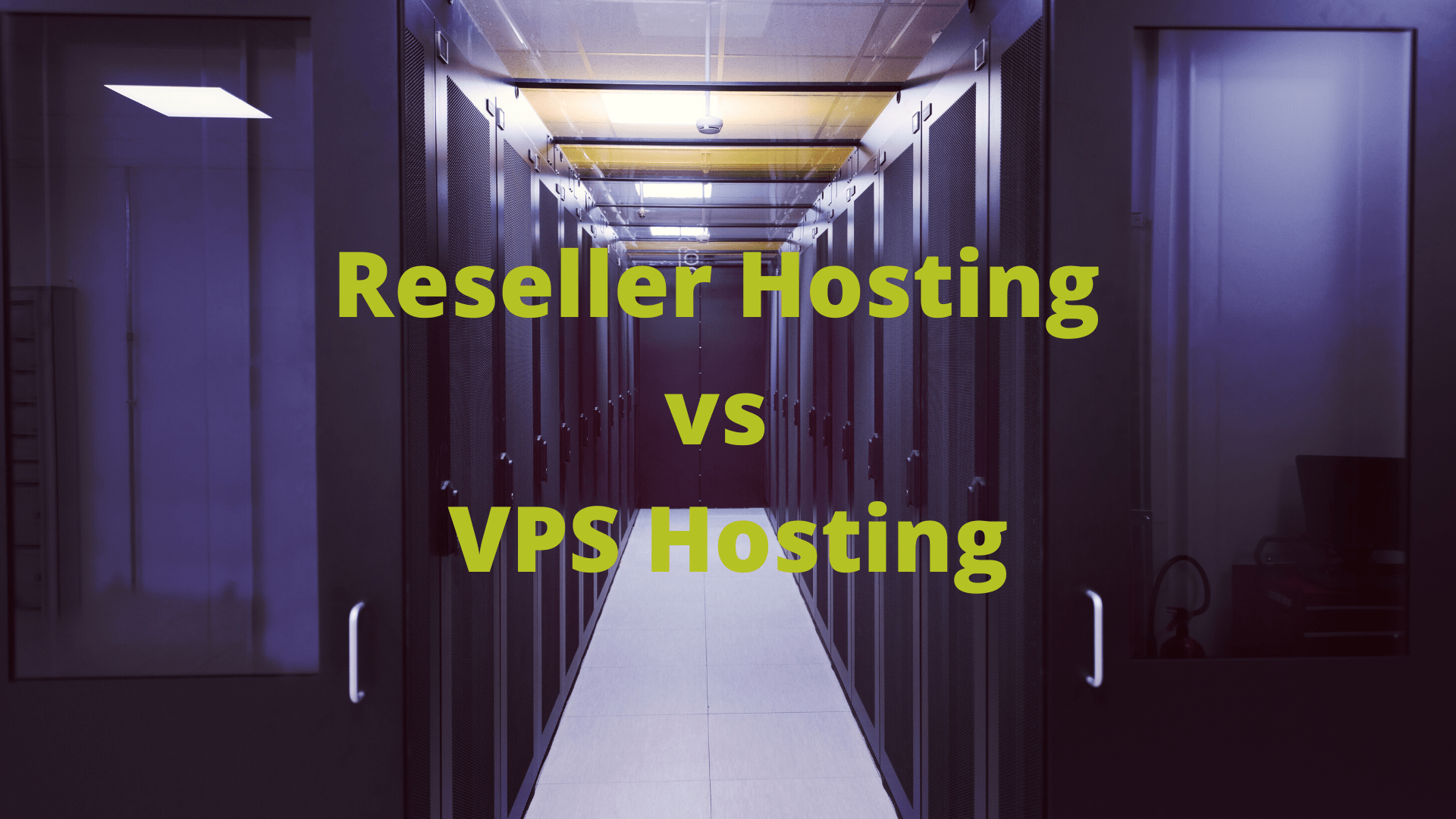Web hosting is an extremely hot business right now. The market is expected to expand at a projected 15.5% Compound Annual Growth Rate (CAGR) until 2027. It’s a big pie, and many of you probably want a slice. However, building a brand new web hosting company is a very complicated and costly undertaking.
Unless you have access to a large volume of resources, your best bet is to try something less ambitious first.
One of your options is to resell VPS hosting. Today, we’ll show you how this business works, how it can grow into a profitable venture, and what you need to bear in mind when developing it.
Choosing a Reseller Web Hosting Partner and Setup

The most crucial step in your journey to becoming a VPS hosting reseller is choosing a host. You want your business to be known for blistering loading speeds and impeccable uptime. However, because you’re reselling a hosting service, this reliability and performance can only come from your host.
Do some proper market research to see which reseller hosting provider will give you the quality you’re after.
Below, you will find the most important factors to consider.
Hardware
At the bottom of every hosting service is a physical machine on which customers deploy their websites. Your host’s servers must be powerful enough to give you and your clients the performance you’re after.
Contact different providers and ask them what sort of hardware they use. Ideally, you’ll want to partner with a company that uses the latest and greatest technologies like NVMe storage.
Features
Picking a reseller package is different from choosing a regular web hosting plan. You will be building your own brand and managing a business simultaneously. However, the infrastructure you will be using is owned by other people, and it’s up to them to ensure you have all the tools you need to do all of the above as quickly and efficiently as possible.
Of course, the entire business will depend on users being able to launch and manage their projects quickly and easily, so the hosting services you’re reselling must make their lives as easy as possible. This means you must look for features that help with both productivity (for example, one-click installers and automated backups) and security (firewalls, DDoS protection, etc.).
Scalability
A small mistake while choosing a hosting partner could undo a lot of hard work later on. For example, let’s imagine you choose a provider that appears to have reasonably priced and feature-rich reseller programs. You launch your business, and it starts to grow. You reach a point where you need more resources, but it turns out your web host cannot provide you with the extra hardware.
It’s a massive setback, and the only way out of it would be to move to another provider, which involves migrating dozens or even hundreds of customer websites. It’s a scenario you want to avoid, so be sure to pick a web host that will give you enough room for growth in the long run.
Price
Ultimately, your business success depends on your profit margins. Your profit margins depend to a large extent on the price of the hosting service you’re reselling. That said, going for the cheapest available plan isn’t necessarily the best strategy.
The price is important, but it’s not as important as the quality. Careful consideration of all the factors is the only way to ensure you have a solid service to build your business on.
Customer Support
Many wrongly assume that customer support is limited to a few people answering client inquiries via phone or live chat. In reality, a hosting provider’s support department must consist of experienced technical experts who are available 24/7 and are ready to react immediately to any malfunction. The idea is to fix any issues before end users notice them so exceptional customer support can help with reliability and performance.
Picking the right hosting provider is the first step toward building a successful reseller business, but it’s not everything. The type of reseller business you’ll set up is just as crucial.
Reseller business solutions can be based on three different setups. If your experience in the industry is limited, you may think they’ll all give you similar results. However, the differences are enormous. Let’s delve a little deeper.
Shared Reseller Hosting
This is the cheapest form of reseller hosting and the most limiting in terms of power and the ability to grow. You have a single physical server shared by multiple reseller businesses. Each reseller deploys their customers’ accounts on it, and everybody draws power from the same hardware simultaneously.
The setup allows the creation of reseller plans that are extremely competitively priced. They are the cheapest solutions in this market segment but far from the best. Because so many people use the same hardware simultaneously, performance is often limited and unreliable.
As your business grows, you’re bound to reach the limits of what’s possible in a shared environment, and the only way out of that situation would be a lengthy and risky migration of dozens of websites from one server to another.
Dedicated Server Reselling
These solutions are not that common nowadays, but you can still spot them occasionally. In basic terms, your hosting provider rents you an entire physical server, which you then rent out to your customers.
The server arrives with its own hardware configuration, and its resources are available to you at all times. As long as you don’t overload the server, performance should be reasonable. Your server also has its own IP, and you’re solely responsible for its reputation.
Overall, it’s a much more powerful solution than the reseller programs based on a shared environment. However, there are a couple of drawbacks.
First of all, a dedicated server is quite expensive. The actual cost depends on the hardware, but you’re usually looking at several hundred dollars per month, so unless you start off with a substantial budget, the dedicated server solutions are likely out of your reach.
It’s not the most flexible setup, either. For example, when you outgrow the server capacity, you can’t just upgrade it. You need to move all your customer websites to a new machine.
All this brings us to the reseller hosting programs that offer the best of both worlds – VPS reseller packages.
VPS Reseller Plans
Instead of a physical server, you can rent a virtual machine. Often, you’ll be hard-pressed to tell the difference.
You still end up with a much more powerful solution compared to the shared environment. Yet again, you have a dedicated IP and a preset hardware configuration.
It’s up to you to decide how you’ll utilize the resources. The difference is that you can change these resources quickly and easily.
If your VPS no longer meets your requirements, you don’t need to move all your customer data to a different machine. More often than not, upgrading the hardware resources of your virtual server requires a couple of clicks and a quick reboot.
So, compared to a shared reseller service, a VPS is a faster, more reliable, and more secure solution thanks to its dedicated IP and guaranteed resources. Pit it against dedicated server alternatives, and it once again stands out thanks to its superior scalability and flexibility.
It’s also more cost-efficient than a dedicated server. VPS reselling is pricier than packages based on a shared hosting environment. Still, because virtualization technology allows hosts to utilize their hardware more efficiently, VPS servers are much cheaper than physical machines.
Unlike a dedicated server, a virtual one lets you start with a more modest budget and grow your business gradually, providing the performance your customers need while keeping the profit margins tidy.
In other words, a VPS server from an established provider is the best reseller choice.
How to Build Your Hosting Services

In theory, reselling VPS services is relatively simple.
You purchase a virtual private server and charge customers in exchange for access to some of its hardware resources. This is the business model’s basic premise, but as always, there are a few additional things to consider. Let’s break them down quickly.
Creating a Strategy and Planning Ahead
Before you start, you need to know what you’re trying to build, what resources you have access to, and how you plan to use them. Do some market research and figure out how much you’ll need to pay to get the VPS services you need and how much you want to resell them for.
Try to build an expected growth trajectory for your business and set yourself realistic goals for the future. Of course, things don’t always work out how you expect them to, so having Plan B (and even Plan C) is a good idea.
Choosing the Right VPS Hardware Configuration
When you’re choosing VPS hosting packages for your own websites, you usually know what sort of requirements you’re dealing with. As a reseller, your job is much trickier because you’ll be hosting projects of all shapes and sizes, and you must ensure your server environment provides them with the performance users expect from a modern-day hosting company.
Indeed, the VPS setup puts you at an advantage. Upgrades are nice and easy, so even if the initial configuration doesn’t give you the speed you’re after, you can quickly solve the issue. Still, starting with an underperforming server won’t do you any favors when you’re trying to build a customer base.
Setting up Your VPS
A VPS, no matter how powerful, cannot host a website and certainly cannot ensure that you’ll manage your reseller hosting business efficiently.
The first thing to consider is the technical configuration of the web server. Whether you’ll need to deal with it at all depends on the type of VPS service you use.
If you get a self-managed virtual machine, you get full root access to the server, and it’s up to you to set it up. This means installing and configuring critical components like the web server, firewall, backup system, etc. You have complete control, but you’re also facing quite a few technical challenges before you can even start thinking about your business.
If you want to skip them, you can opt for a managed virtual server. With it, all the work related to the VPS deployment and configuration is left to your host’s technical experts. Choose the correct hosting provider, and you will be in the hands of people with extensive experience who know what they’re doing. Managed VPS plans are a bit more expensive than self-managed ones, but given how much work they save you, the additional costs are often worth it.
A managed VPS is bound to come with a server management platform like WHM/cPanel or SPanel. Through it, you’ll create and manage your customer accounts and allow them to launch and build their projects with the help of an intuitive graphical user interface.
You’ll also want to set up a billing and account management platform to automate many crucial processes in setting up the hosting environment for new clients. WHMCS is the most popular solution of this kind, and it’s compatible with most control panels.
At this stage, you need to have a good look at all these platforms, familiarize yourself with them, and figure out how they work.
Re-branding Your VPS
VPS reseller programs are not reserved for startup web hosting businesses. Web developers, freelance programmers, designers, system administrators, and marketing professionals can also use them. In almost all cases, however, they don’t want to advertise that they’re reselling their hosting service.
Fortunately, many popular server management platforms have features that allow you to personalize them and situate your logo in front of users’ eyes. Making good use of them will let you build brand awareness and convince your customers that they’re in the hands of a professional.
If you’re building a reseller business, you’ll also want to find a host that supports private name servers. Preferably, they’ll offer them for free.
Setting up Additional Services
Bare-bones hosting services aren’t particularly popular nowadays. The competition is stiff, and providers are constantly trying to lure customers by offering numerous benefits and features that make people’s lives easier. As a reseller, it’s also essential to convince website owners that your services bring more added value than the competition.
You can start with the more basic stuff. Check whether you can resell domain registrations, for example. You’ll have a source of additional revenue, but more importantly, you’ll improve the user experience because your customers will be able to manage both their hosting and their domain from the same interface.
Depending on your hosting environment and your technical expertise, you may be able to add more extras to your service. With so many reseller hosting services out there, you’re unlikely to reinvent the wheel, but this shouldn’t stop you from trying to create an attractive package.
Setting up Technical Support Communication Channels and Procedures
Slow and inefficient technical support is one of the most significant sources of customer disappointment and frustration. As a reseller, some things are outside your control. Still, you must ensure you’re there when your customers need you, and you have to communicate with your host in order to fix any potential issues as quickly as possible.
Creating Your Business Website
Whether you’re trying to build your own hosting company or resell the hosting service alongside your web development business, you must convince users that you can provide the perfect environment for deploying and growing their projects.
A good-looking website is critical, but don’t focus entirely on design and brand-building. Your site must also be functional, and if you’re building a reseller business, it must be integrated with WHMCS.
Marketing Your Business
Your next job is to place the website in front of users’ eyes. This is always easier said than done, but with the right plan, you can do it with minimal effort. Your steps are determined by how you want to position yourself within the industry.
For example, the keyword strategy of a hosting company focusing on a local market differs from that used by a global provider. Once the target audience is determined, you can start working on getting the word out.
As always, there are more than a few things to consider, but the three main aspects you should focus on are search engine optimization, content marketing, and social networks.
ScalaHosting for Resellers

ScalaHosting’s focus has always been on VPS hosting. Virtualization is the way forward, especially given the leaps and bounds cloud technology has experienced in recent years.
However, we appreciate that new clients looking to start a reseller business on a shoestring may not be able to afford a virtual server straightaway. That’s why, at the lower end of our reseller portfolio, you have solutions based on a shared environment. With them, you can get the infrastructure that helps you start your business for less than $20 per month.
The shared plans are based on cPanel, so users will manage their projects through an interface familiar to many. In the meantime, you have access to WHM to manage their accounts.
Despite their affordable prices, our shared reseller packages are powered by state-of-the-art hardware. You get a choice of data centers on four continents. All facilities are modern and equipped with cutting-edge HVAC, power, and internet connectivity systems.
All ScalaHosting plans, including our shared reseller business solutions, come with daily offsite backups. Secure copies of your customer websites are stored in a different location from their accounts, minimizing the risk of data loss even in a worst-case scenario.
The limiting factors with the shared reseller plans are the number of cPanel accounts and the storage space. Our shared reseller platforms allow you to get up to 60 cPanel accounts and up to 150GB of storage.
If you use our hosting services to become a VPS reseller, you’ll have a much more flexible solution. In fact, the service is superior in pretty much every respect.
This time, you can choose between 13 locations: 3 in the US, 8 in Europe, 1 in Asia, and 1 in Australia. Regardless of the geographical region you’re targeting, you’ll have an easier time finding a suitable data center for your virtual server.
From a technical standpoint, our virtual machines are based on KVM virtualization technology, which offers several advantages.
Let’s examine them below:
- Guaranteed resources and stable performance: KVM gives us fine-grained control over how much storage, memory, and processing power each VPS gets, which ensures our customers get the speed they’re after and allows us to utilize our hardware more efficiently. The upshot is a high-quality service at a very reasonable price.
- A choice of an operating system for your VPS: KVM classifies as a full virtualization kernel module, meaning the virtual machines deployed on the physical server work independently from the host’s operating system. As a result, you can deploy Windows virtual machines on top of Linux infrastructure. ScalaHosting makes this option available to the users of our self-managed VPS solutions.
- Enhanced security: KVM uses process isolation to separate individual virtual machines from the host and other containers on the same server. This, coupled with the fact that your VPS has a separate operating system with its own kernel, reduces the risk of security breaches.
- Top-notch scalability: KVM’s remarkable scalability allows us to implement it in a proper cloud environment, which, in turn, provides numerous benefits for both resellers and website owners.
- Advanced features: KVM has quite a few features that may not seem particularly relevant to you as a non-techie reseller, but it can make a massive difference in the quality of the service. For example, live migration support allows us to minimize downtime, and the ability to create snapshots lets us ensure your business will be brought back online quickly if the worst happens.
There’s another advantage to VPS reselling at ScalaHosting over the shared hosting-based plans. Your virtual server is powered by SPanel – our proprietary server management platform.
Our customer base includes everything from government organizations and large web development agencies to individual website owners and, of course, resellers. Our goal with SPanel is to ensure that all these businesses and individuals go through their everyday work lives with as little effort as possible.
For example, here’s how a typical reseller business works on SPanel. After the server is deployed, your first job is to create an admin account with access to the SPanel Admin Interface. Through it, you’ll monitor the VPS health and manage your customer accounts.
Next, you need to install the free WHMCS module for SPanel. Our detailed tutorial will show you the exact steps.
After WHMCS is installed on your server and integrated into your website, it will automatically create a new SPanel user account every time a user signs up for your service.
They’ll get access to the User Interface, which has all the tools they need to build their websites. WHMCS can also automatically suspend, terminate, upgrade, and downgrade accounts.
The most significant advantage of SPanel servers hosted by ScalaHosting over cPanel-based solutions is that because SPanel is our own proprietary software, our customers can use it at no extra cost.
In other words, as your business grows, you won’t need to worry about licensing fees eating away your profits. You’ll just have to ensure your server is powerful enough to accommodate your customers’ projects, which is effortless thanks to our cloud infrastructure.
If you want to learn more about our VPS reseller solutions, do not hesitate to contact our sales specialists, who will assist you further.


Conclusion
The demand for VPS solutions has exploded over the last few years. It’s the industry’s fastest-growing segment, and anyone familiar with the setup should have no problems seeing why people love it so much.
In addition to consistent performance and bullet-proof security, virtual servers are also extremely versatile and can cater to the needs of anyone looking for a hosting service. This, as we’ve found out today, includes resellers.
Frequently Asked Questions
Q: Why do people resell web hosting?
A: Reseller business solutions are primarily aimed at people who want to start a small-scale hosting company. However, other individuals and organizations can also take advantage of the setup. For example, developers can bundle their development services with hosting, saving clients the need to look for a dedicated provider.
Q: What control panels do hosts provide?
A: cPanel has dominated the web hosting control panel market for a while now. However, recent ownership changes have resulted in several price hikes, and because the licensing fees are paid on a per-account basis, resellers have been hit the hardest. Users are now looking for an alternative, and for many, it comes in the form of SPanel – ScalaHosting’s proprietary server management platform. It has all the features you need to power a successful reseller business.
Q: Which reseller hosting is best?
A: VPS hosting is the best platform for launching a successful reseller business. On the one hand, its price allows you to maintain healthy profit margins during the tricky first few months. On the other hand, it’s powerful and scalable enough to support your growth in the long run. Couple this with a solid control panel like SPanel, and managing your business will seem like a breeze.





